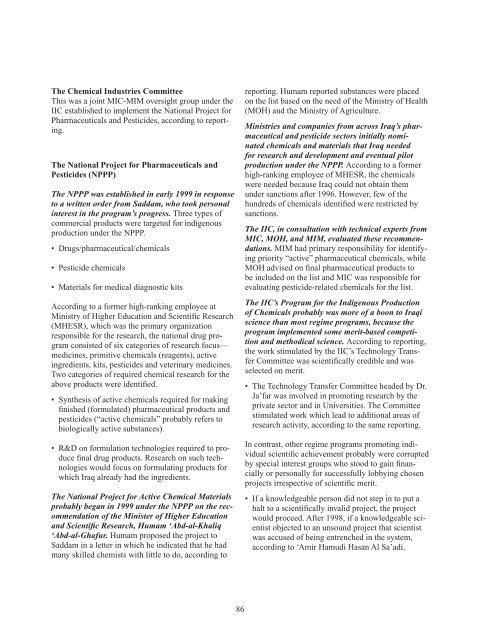Comprehensive Report
GPO-DUELFERREPORT-3
GPO-DUELFERREPORT-3
- No tags were found...
Create successful ePaper yourself
Turn your PDF publications into a flip-book with our unique Google optimized e-Paper software.
The Chemical Industries Committee<br />
This was a joint MIC-MIM oversight group under the<br />
IIC established to implement the National Project for<br />
Pharmaceuticals and Pesticides, according to reporting.<br />
The National Project for Pharmaceuticals and<br />
Pesticides (NPPP)<br />
The NPPP was established in early 1999 in response<br />
to a written order from Saddam, who took personal<br />
interest in the program’s progress. Three types of<br />
commercial products were targeted for indigenous<br />
production under the NPPP.<br />
• Drugs/pharmaceutical/chemicals<br />
• Pesticide chemicals<br />
• Materials for medical diagnostic kits<br />
According to a former high-ranking employee at<br />
Ministry of Higher Education and Scientific Research<br />
(MHESR), which was the primary organization<br />
responsible for the research, the national drug program<br />
consisted of six categories of research focus—<br />
medicines, primitive chemicals (reagents), active<br />
ingredients, kits, pesticides and veterinary medicines.<br />
Two categories of required chemical research for the<br />
above products were identified.<br />
• Synthesis of active chemicals required for making<br />
finished (formulated) pharmaceutical products and<br />
pesticides (“active chemicals” probably refers to<br />
biologically active substances).<br />
• R&D on formulation technologies required to produce<br />
final drug products. Research on such technologies<br />
would focus on formulating products for<br />
which Iraq already had the ingredients.<br />
The National Project for Active Chemical Materials<br />
probably began in 1999 under the NPPP on the recommendation<br />
of the Minister of Higher Education<br />
and Scientific Research, Humam ‘Abd-al-Khaliq<br />
‘Abd-al-Ghafur. Humam proposed the project to<br />
Saddam in a letter in which he indicated that he had<br />
many skilled chemists with little to do, according to<br />
reporting. Humam reported substances were placed<br />
on the list based on the need of the Ministry of Health<br />
(MOH) and the Ministry of Agriculture.<br />
Ministries and companies from across Iraq’s pharmaceutical<br />
and pesticide sectors initially nominated<br />
chemicals and materials that Iraq needed<br />
for research and development and eventual pilot<br />
production under the NPPP. According to a former<br />
high-ranking employee of MHESR, the chemicals<br />
were needed because Iraq could not obtain them<br />
under sanctions after 1996. However, few of the<br />
hundreds of chemicals identified were restricted by<br />
sanctions.<br />
The IIC, in consultation with technical experts from<br />
MIC, MOH, and MIM, evaluated these recommendations.<br />
MIM had primary responsibility for identifying<br />
priority “active” pharmaceutical chemicals, while<br />
MOH advised on final pharmaceutical products to<br />
be included on the list and MIC was responsible for<br />
evaluating pesticide-related chemicals for the list.<br />
The IIC’s Program for the Indigenous Production<br />
of Chemicals probably was more of a boon to Iraqi<br />
science than most regime programs, because the<br />
program implemented some merit-based competition<br />
and methodical science. According to reporting,<br />
the work stimulated by the IIC’s Technology Transfer<br />
Committee was scientifically credible and was<br />
selected on merit.<br />
• The Technology Transfer Committee headed by Dr.<br />
Ja’far was involved in promoting research by the<br />
private sector and in Universities. The Committee<br />
stimulated work which lead to additional areas of<br />
research activity, according to the same reporting.<br />
In contrast, other regime programs promoting individual<br />
scientific achievement probably were corrupted<br />
by special interest groups who stood to gain financially<br />
or personally for successfully lobbying chosen<br />
projects irrespective of scientific merit.<br />
• If a knowledgeable person did not step in to put a<br />
halt to a scientifically invalid project, the project<br />
would proceed. After 1998, if a knowledgeable scientist<br />
objected to an unsound project that scientist<br />
was accused of being entrenched in the system,<br />
according to ‘Amir Hamudi Hasan Al Sa’adi.<br />
86


